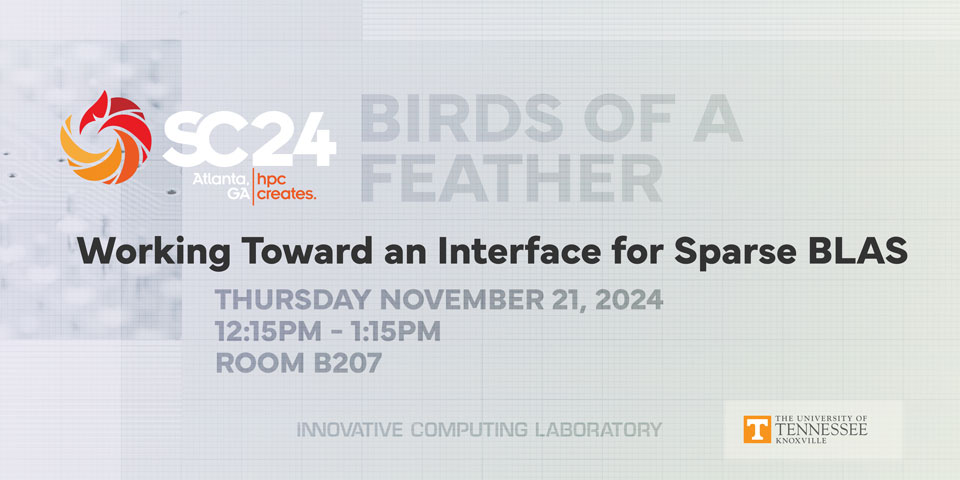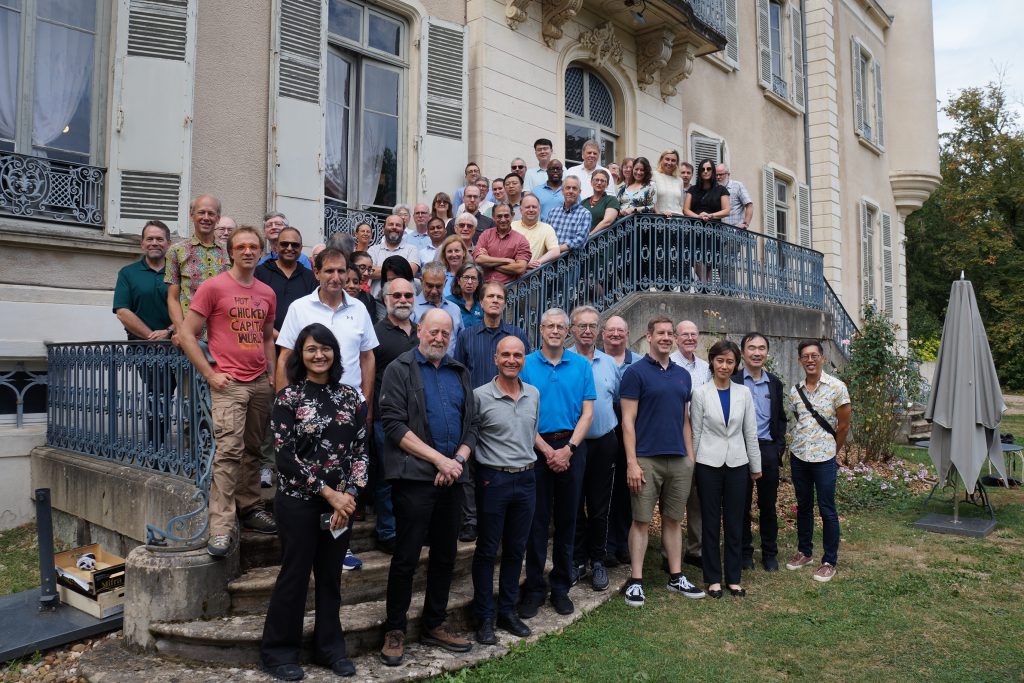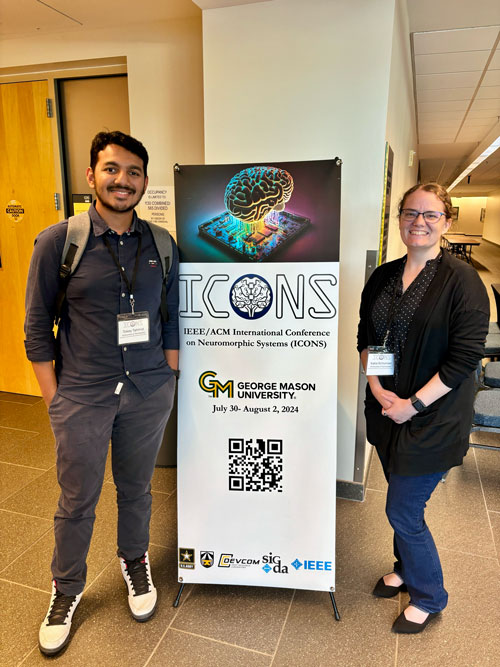2024 ICL Retreat Held at Ijams Nature Center
The 2024 ICL Retreat took place on August 14, 2024, at Ijams Nature Center. This year’s smaller group size allowed for a streamlined, one-day program that began with breakfast and concluded with a formal dinner following a full day of presentations and discussions. The natural beauty of Ijams provided an ideal backdrop for the retreat’s activities. Unfortunately, Jack was unable to attend in person due to a positive COVID-19 diagnosis; however, he presented his talk “An Overview of High Performance Computing” at the ICL Friday Lunch on September 13.
ICL Launches NSF-funded MINCER
ICL is symbolically “mincing” or breaking down the complexity of large volumes of performance monitoring data with MINCER, an NSF-funded project titled “Monitoring Infrastructure for Network and Computing Environment Research (MINCER)“. This project is led by Heike Jagode as the PI and includes a subcontract with the University of Texas at El Paso, partnering with Shirley Moore and Deepak Tosh. Spanning three years, the project started in August 2024, with a total budget of $2 million, of which ICL’s share is $1.4 million.
MINCER aims to provide comprehensive insights into distributed heterogeneous computing environments to foster research and education in platform reliability, efficiency, and security through three main thrusts: (1) Enhanced performance and power monitoring capabilities for AI architectures to support research aimed at improving AI system performance and utilization, thus enabling informed decisions on optimization and system configurations. (2) Unique network-related measurements to support research in network anomaly detection, resilience, and energy efficiency. (3) Integration of the MINCER monitoring infrastructure with research platforms like Chameleon and the Open Science Grid to enhance the understanding of cloud and edge computing dynamics, as well as the relationship between data transfer and computation in large-scale distributed computing.
HPCwire Recognizes Jack Dongarra in Inaugural HPCwire 35 Legends
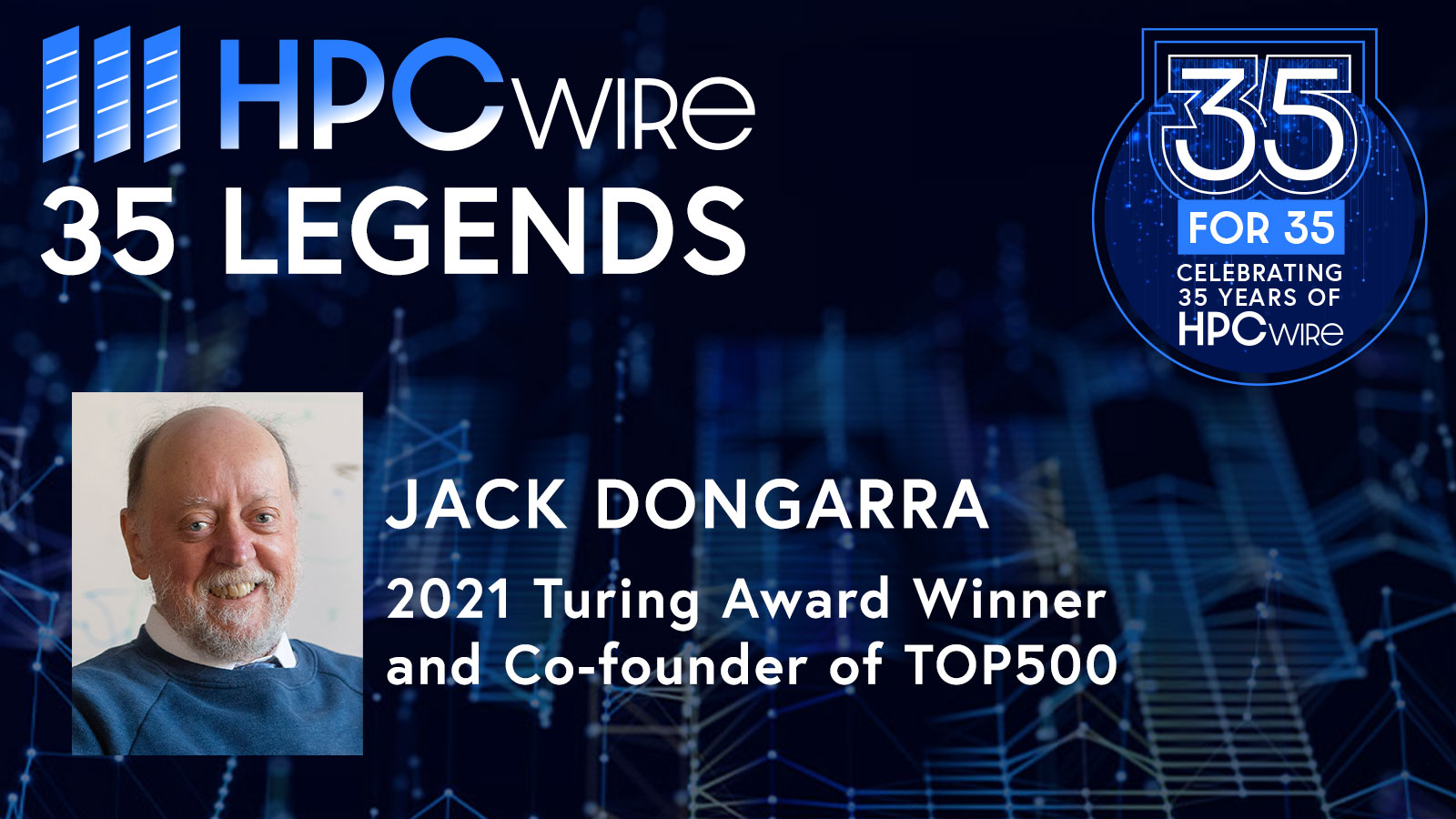
ACM Turing Award winner Dr. Jack Dongarra’s career in HPC began with his education in mathematics and computer science, culminating in a Ph.D. from the University of New Mexico, where h was introduced to numerical linear algebra, a foundational field in HPC.
Dongarra’s pivotal work at Argonne National Laboratory involved developing algorithms for the LINPACK library, which became a standard for measuring supercomputer performance. Dongarra told HPCwire this experience exposed him to the challenges and opportunities in scientific computing, motivating him to pursue a career dedicated to improving performance and efficiency of computational methods.
His contributions at the University of Tennessee and ORNL bridged academic research and practical HPC applications, leading to the development of the LAPACK and ScaLAPACK libraries, as well as the creation of the famed Top500 list of supercomputers.
Wall Street Journal Article Highlights China’s Growing Secrecy in Supercomputing Amid U.S. Tech Restrictions
The July 23 Wall Street Journal article, “China Is Getting Secretive About Its Supercomputers,” explores China’s increasing secrecy around its supercomputing advancements due to U.S. export restrictions on advanced chips. The article includes insights from ICL founder Jack Dongarra, who, through his work with the Top500 list, provides perspective on the global supercomputing race, emphasizing China’s potential to have faster machines despite their lack of public submissions.
Sparse BLAS Working Group BoF at SC24
While sparse matrix computations are at the heart of many scientific and engineering applications, there exists no widely adopted interface standard. ICL’s Hartwig Anzt is part of a cross-institutional effort involving academia and industry to define an API for sparse linear algebra operations. Hartwig presented an overview of this effort at a recent ICL Lunch Talk.
A community-driven approach is crucial for ensuring that the resulting standard caters to the diverse needs of users and gains widespread adoption. To this end, Hartwig will be leading a Sparse BLAS BoF at SC24 on Thursday, November 21 to present a blueprint of the Sparse BLAS standard, discuss the considerations behind key design choices, and solicit feedback from the community. There will be an option to join the BoF virtually. See the website for full details.
Congratulations
PEARC24 Best Student Paper for PyMAGMA: A Python Interface for MAGMA
Congratulations to current UTK EECS and former ICL student Julian Halloy, whose work on PyMAGMA: A Python Interface for MAGMA was recently recognized with a Best Student Paper award at the PEARC24 conference. Julian worked with co-author Stan Tomov on the work. From the abstract:
“The Matrix Algebra for GPU and Multicore Architectures (MAGMA) library is used for dense linear algebra computations on both CPUs and GPUs. MAGMA offers an extensive selection of linear algebra routines similar to those found in BLAS and LAPACK, but optimized and specifically designed for GPU acceleration. However, as MAGMA is a C library, C/C++ and MAGMA’s C function interfaces can be challenging for non-computer scientists to learn and use. To address this problem, PyMAGMA provides a user-friendly Python interface. PyMAGMA employs C++ object-oriented programming methodologies to simplify the interfaces, particularly by reducing the number of arguments required for routines and eliminating the need for specifying the floating-point data format and arithmetic precision used. In particular, function overloading is employed to abstract routines and avoid precision specification. We show that the PyMAGMA library provides access to high-performance linear algebra using GPUs, while offering the typical benefits of Python, including ease of learning, versatility of use, extensive access to external libraries, large community and support, cross-platform compatibility, and capability for interactive work.”
Conference Reports
CCDSC 2024
The 2024 Workshop on Clusters, Clouds, and Data for Scientific Computing (CCDSC) was held at La Maison des Contes near Lyon, France, September 3rd – 6th, and brought together over 60 leading experts in HPC, clusters, and cloud computing from around the world.
This workshop is part of a biennial series that began in 1992, alternating between the U.S. and France. The purpose of this workshop, which is by invitation only, is to evaluate the state-of-the-art and future trends for cluster computing and the use of computational clouds for scientific computing. This year’s edition explored the evolving intersection of HPC, AI, and cloud technologies, with a focus on addressing scientific computing challenges. The venue, a historic château dating back to the 19th century, provided a picturesque backdrop for the event.
IEEE/ACM ICONS 2024
ICL’s Tokey Tahmid recently had the opportunity to attend the IEEE/ACM International Conference on Neuromorphic Systems, held July 30-August 2 at George Mason University in Arlington, Virginia. The goal of ICONS is to bring together leading researchers in neuromorphic computing to present new research, develop new collaborations, and provide a forum to publish work in this area.
Tahmid presented “Towards Scalable and Efficient Spiking Reinforcement Learning for Continuous Control Tasks”, work co-authored by his advisors: ICL’s Mark Gates and Piotr Luszczek and UTK’s Catherine Schuman. This work addresses the question of scalability and efficiency of Spiking Neural Networks in real-world continuous control problems such as mobile robots. The authors address these challenges by adopting a Deep Reinforcement Learning based Spiking Neural Network algorithm paired with MPI for distributed training, and mixed-precision for optimization. Demonstrated results showed significant improvement in performance scalability and efficiency.
Recent Releases
PAPI 7.20b
The PAPI team issued a new release of PAPI, version 7.20b. This release introduces a new component, “rocp_sdk”, which supports AMD GPUs/APUs through the ROCprofiler-SDK interface, currently still under development and testing. The release also includes general improvements to the PAPI code, enhancing both design and functionality, as well as various bug fixes. See the PAPI Github page for a more complete list of new features and to download the software.
Interview
Dong Jun Woun
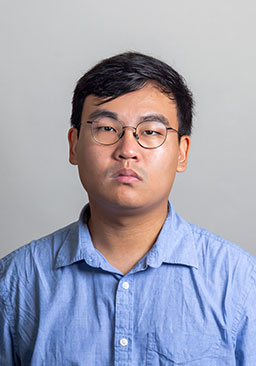
Where are you from originally?
I’m from Daejeon, South Korea. Even though it’s been many years since I left, I still root for the Hanwha Eagles, my favorite baseball team in the KBO league. One of my fondest childhood memories is visiting the Sungsingdam bakery, which has the best fried peanut streusel filled with red bean paste.
Can you summarize your educational and professional background?
I recently graduated from the University of Tennessee with a bachelor’s degree in Computer Science, with minors in Cyber Security and Machine Learning. I’m continuing my studies as a graduate student at UT and joining ICL as a graduate research assistant under the guidance of Heike Jagode. During my undergraduate studies, I had the opportunity to intern at Oak Ridge National Laboratory, where I was mentored by Dr. Prasanna Date.
How did you first hear about ICL, and what made you want to work here?
Throughout my undergraduate years at UT, I read and heard about ICL. I’ve always aimed to apply my skills to make a positive difference in the world, and ICL’s mission resonated with that goal. I’m excited to be part of ICL and look forward to contributing to the innovative projects here.
What are your main research interests and what do you work on at ICL?
My primary research interests lie in machine learning, performance counting, and cybersecurity. As a Research Intern at Oak Ridge National Laboratory, I had the chance to compare a machine learning model’s performance on a quantum computer versus a traditional computer.
Additionally, I’ve always been interested in hardware benchmarking, inspired by watching videos from channels like Hardware Unboxed, Gamer’s Nexus, and BullsLab. I’ve used benchmarking tools to optimize performance on my personal devices. I’m thrilled to join the performance group at ICL and work on benchmarking for High-Performance Computers.
What would you like to do next in your career?
I aim to continue applying my skills to create and improve technology, driving meaningful change. Although I initially entered college as a Civil Engineering major, my passion for using engineering to make a positive impact has remained consistent.
What are your interests/hobbies outside of work?
In my free time, I enjoy learning about history, particularly the industrial era. I also like working out, lifting weights and running. Additionally, I’m a fan of video games, mainly strategy games like Civilization 6 or Stellaris. I also enjoy multiplayer games like Chained Together or League of Legends.
Tell us something about yourself that might surprise people.
I’ve experienced moving every two to three years, having relocated four times. I’ve lived in Daejeon, Korea for 9 years, Budapest, Hungary for four years, and Tennessee for 9 years, spending five years in Clarksville and four years in Knoxville.


